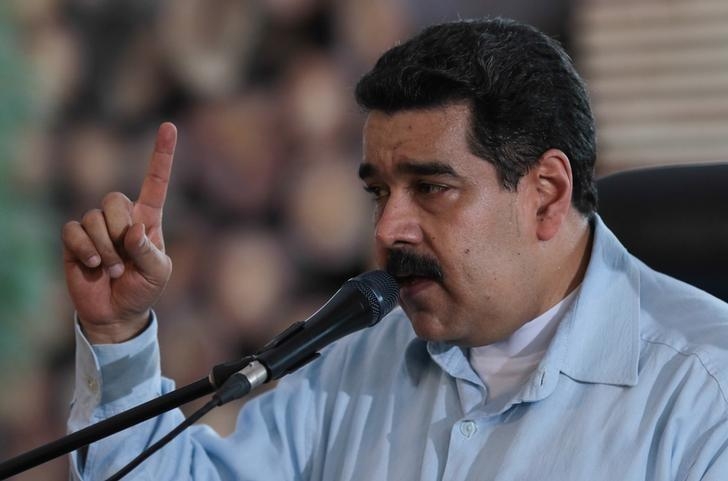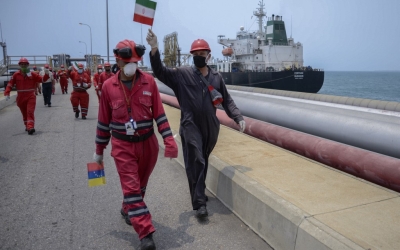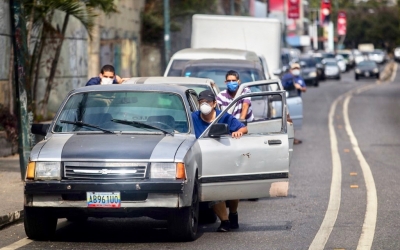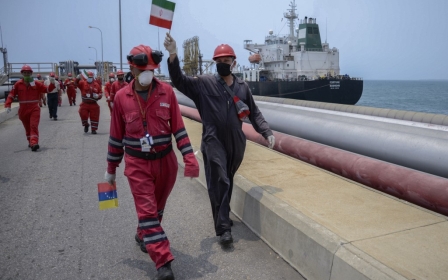Venezuela 'agent' detained en route to Iran can be held in Cape Verde, says court

A court in Cape Verde has ruled that the West African nation can hold a businessman who is close to Venezuelan President Nicolas Maduro for up to 40 days pending an extradition request from the United States.
Alex Saab, a Colombian national who Maduro's government said was on a mission to secure food and medicine, was arrested on the island of Sal on Saturday as a plane taking him and others to Iran stopped to refuel.
New MEE newsletter: Jerusalem Dispatch
Sign up to get the latest insights and analysis on Israel-Palestine, alongside Turkey Unpacked and other MEE newsletters
Cape Verde prosecutor Jose Landim told CV National Radio before the court ruling late on Sunday that a country asking for an extradition had 18 days to make the formal request, but that the period could be extended to 40 days.
State television in Cape Verde showed Saab, 48, in handcuffs, being escorted into a building by two policemen.
Saab is a Colombo-Venezuelan businessman of Lebanese descent who reportedly owns companies in Colombia, Hong Kong, Turkey, UAE, Mexico, Panama and the United States.
A police source in Cape Verde said Saab was the only person detained when the private jet stopped to refuel on Sal, one of the most popular tourist destinations on the archipelago, some 670km off the West African coastline.
The plane had come from Venezuela and continued to Iran without Saab, the police source said.
US and Cape Verdean authorities said Saab was detained after an Interpol red notice had been issued for him.
'Agent' of Venezuela
Washington accuses Saab of laundering money in Venezuela through shell companies in Colombia, Hong Kong, Mexico, Turkey and the United Arab Emirates.
The US indicted him in July 2019 and another businessman for diverting $350m to overseas accounts.
Saab is also reportedly helping Maduro's government purchase oil from Iran in exchange for gold, in order to get around US sanctions.
Bloomberg reported last month that Saab helped negotiate the Iran deal with Maduro's new Oil Minister Tareck El Aissami.
Saab's Miami-based lawyer, Maria Dominguez, denied the charges saying her client was a "food business entrepreneur".
Venezuela, which has called the arrest an "arbitrary detention" said Saab was travelling as an "agent" of the state on a work trip to secure supplies to help the country tackle the coronavirus pandemic.
US enemies join forces
Meanwhile, sources have told Reuters that Iran could send two to three cargoes a month in regular petrol sales to ally Venezuela, helping offload domestic oversupply but risking retaliation from US President Donald Trump who has sanctions on both nations.
The US has imposed a total economic embargo on Venezuela, including its vital oil sector which is the country's main source of export earnings.
Iran has since April sent five tankers totalling about 1.5m barrels to the government of fuel-starved Venezuela, though the shipments have so far done little to alleviate hours-long lines at petrol stations.
The Trump administration, which is seeking both to block Iran's energy trade and bring down Maduro, has threatened reprisals and warned ports, shipping companies and insurers against facilitating the tankers.
But Tehran plans to keep up the shipments, according to five trading and industry sources close to the oil ministry.
Two of the sources told Reuters that Iran's Revolutionary Guards military unit, which answers to Supreme Leader Ayatollah Ali Khamenei, were determining policy on Venezuela.
"This is a long-term strategic decision made by the state to expand influence," said one Iranian trader familiar with the policy, likening it to Iran's cargoes for Syria.
Requests from Reuters for comment from the Revolutionary Guards and Iran's oil ministry, and from Venezuela's state oil company PDVSA, oil ministry and information ministry, were not answered.
A State Department spokesperson said the United States would not tolerate "meddling" or sanction-breaking to support Venezuela, but did not specify what actions could be taken.
"The international business community should already be aware of the legal risk of any transactions with the illegitimate and tyrannical regime of Nicolas Maduro," he told Reuters.
"It is no surprise that the deeply corrupt and oppressive Iranian regime would find a kindred spirit with Maduro's brutal kleptocracy."
In the last two years, Trump has quit a nuclear deal with Tehran and reimposed sanctions on Iran's energy and bank sectors plus the Revolutionary Guards.
'Venezuela is the only viable option'
A net petrol importer for decades, Iran has seen exports plummet since US sanctions were reimposed in 2018.
But the coronavirus pandemic cut demand further to almost 450,000 bpd in the first quarter of 2020 from about 650,000 last year, according to energy consultancy FGE.
Even before the virus, oversupply caused by the wide reach of US sanctions, forcing third countries to cut orders, had reached 84,000 bpd of petrol in the last quarter of 2019, but it soared to 172,000 in the first three months of this year, according to FGE.
With insufficient storage capacity, Iran was unprepared for the glut, the trading and industry sources said, meaning Maduro's appeal for help fell on ready ears.
"Iran's gasoline oversupply equals 15 to 20 medium cargoes every month," said one of the sources.
"Iran exports only five cargoes a month to Asia and Africa. So Venezuela is the only viable option."
All the sources asked not to be named due to the sensitivity of the subject.
Tehran not hiding shipments
Iran is also helping Venezuela restart its mostly idled 1.3 million bpd refining network.
An Iranian-flagged cargo ship is currently making its way toward Venezuela, according to an analysis of the vessel's trajectory by oil industry data provider TankerTrackers.com, which added it was carrying refining equipment.
Refinitiv Eikon data show the vessel, the Golsan, is navigating west across the Atlantic Ocean after departing Iran's Bandar Abbas - the same port where the petrol cargoes came from in May.
The shipment comes after Iran sent refining equipment to Venezuela through more than a dozen flights by sanctioned airline Mahan Air earlier this year.
Even when the pandemic has passed and domestic demand picks up to an estimated 550,000 bpd in the second half of this year, Iran will still have the capacity to send two to three cargoes to Venezuela per month, according to traders and FGE data.
A medium tanker, of the sort Iran has been sending to Venezuela, can carry between 190,000-345,000 barrels.
Though the political solidarity is evident, with Maduro due to visit Tehran soon to "thank the people", Reuters has not been able to establish the financial details of Iran's trade with Venezuela.
The deal could, however, help Iran stem potential losses at the production end from storage reaching capacity, according to the head of one oil products trading firm in Tehran.
"For every single day that a refinery is shut down, the loss will be far greater than exporting cheap gasoline to Venezuela," he said.
Tehran has not been hiding its trade with Caracas.
Unlike most Iranian tankers that turn off transponders for shipments skirting US sanctions, the five ships delivering to Venezuela kept their automatic identification system on.
Middle East Eye delivers independent and unrivalled coverage and analysis of the Middle East, North Africa and beyond. To learn more about republishing this content and the associated fees, please fill out this form. More about MEE can be found here.







